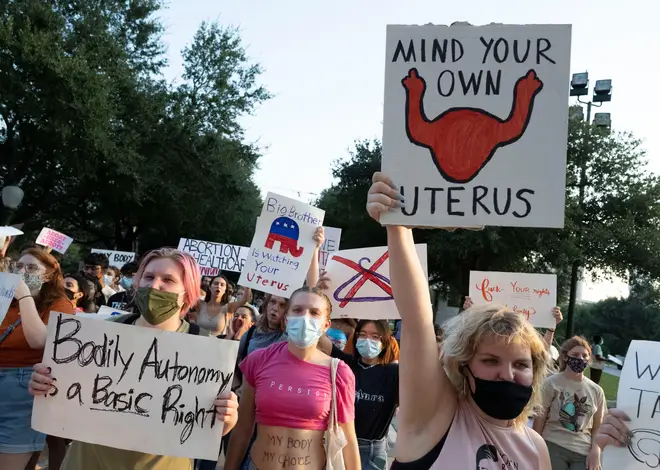
Nick Abbot 10pm - 1am
2 September 2021, 15:20

Abortions after six weeks of pregnancy will be banned in Texas after the US Supreme Court voted down an emergency call to block the move.
The Supreme Court voted 5-4 to deny an emergency appeal from abortion providers against a law banning abortions in Texas after six weeks, including in the case of rape or incest.
A split vote by the US Supreme Court allowed the law that bans abortions for most women in Texas to remain in force.
The law, which prevents abortions once medical professionals can detect cardiac activity in the foetus, was signed by Republican Governor Greg Abbot in May. This equates to around 6 weeks into pregnancy.
The campaigners who sought the Supreme Court's ruling said that the new law would effectively ban 85% of abortions in Texas.
A dozen other states have also passed similar laws, but they have all been blocked by the courts.
Many medical experts have criticised the so-called "heartbeat" laws, saying the term is misleading.
Pro-choice campaigners have criticised the new law, and protests have been held across the world in support of women living in Texas.
Read more: Changes to abortion rules have 'life-changing consequences' for women, court hears
Read more: Child sex abuse takes place in almost all major UK religions, inquiry finds
After the law came into effect, US president Joe Biden said it "blatantly violates the constitutional right established under Roe v Wade and upheld as precedent for nearly half-a-century".
Marc Hearron, a lawyer for the Centre for Reproductive Rights, told reporters that "as of now, most abortion is banned in Texas".
The new law, Senate Bill 8, bars abortion once embryonic cardiac activity is detected and offers no exceptions for rape or incest. Texas is the first state to ban abortion this early in pregnancy since Roe v Wade.
Roe v. Wade was a landmark case in US law in 1973, which ruled that unduly restrictive state abortion laws were unconstitutional.

Student at high school in Texas takes stand against abortion bill
Unlike other attempts to introduce the law, the Texas version encourages private citizens to bring a civil suit against an abortion provider or anyone who "aids or abets" an abortion. This could include driving a woman to get an abortion.
Anyone successful would be entitled to at least $10,000, or over £7,000.
The court's order declining to halt the Texas law came just before midnight on Wednesday.
THE TRUTH:
— Amy Klobuchar (@amyklobuchar) September 2, 2021
In dissent, Justice Sotomayor calls midnight 5-Justice decision allowing the Texas law banning abortions after 6 weeks to stand even in cases of rape and incest “stunning.” “A flagrantly unconstitutional law engineered to prohibit women from exercising their rights.”
Read more: 'Harrowing' rise in deaths of children linked to abuse or neglect during pandemic
"In reaching this conclusion, we stress that we do not purport to resolve definitively any jurisdictional or substantive claim in the applicants' lawsuit. In particular, this order is not based on any conclusion about the constitutionality of Texas's law, and in no way limits other procedurally proper challenges to the Texas law, including in Texas state courts," the unsigned order said.
Chief Justice John Roberts dissented along with the court's three liberal justices: Justice Stephen Breyer, Justice Sonia Sotomayor and Justice Elena Kagan.
The justices are preparing to hear a similar case for the state of Mississippi, which wants to ban abortions after 15 weeks.